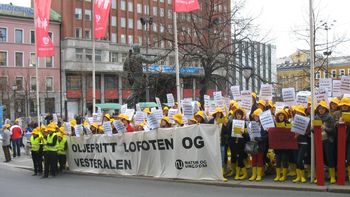Lofoten is a group of islands above the Arctic Circle in northern Norway consisting of six municipalities. It is known for its breathtaking nature including mountains looking like they are sprouting out from the ocean, small fishing towns, northern lights, and midnight sun. The islands are heavily dependent on their fishing and tourism industry (Thorsnæs, 2017).
MDG and other environmental organizations argue that these islands must be preserved and protected. To begin, there is an issue of esthetics. Even though the some of the oil platforms would be far off the coast of Lofoten, some could be located at a distance where they are visible from the shore. Thus, these oil platforms could discourage tourists to visit the islands, which in turn could harm the tourism industry. Furthermore, expanding oil excavation in Norwegian waters would result in an increase in carbon emissions, which contrasts Norway’s current mission of reducing carbon emissions and pledging to become a more environmentally sustainable country. Additionally, and perhaps the greatest argument against oil drilling in Lofoten, is the risk of a catastrophe that would have a horrific effect on the marine ecology and other aspects of the environment. Recently, MDG has pointed to the Deepwater Horizon oil spill in 2010, which saw 4 million barrels of oil leaking into the Gulf of Mexico over an 87-day period following an explosion at the Deepwater Horizon oil rig owned by BP (EPA, 2017).
The political parties for oil excavation in Lofoten, such as the Labor Party and the Conservative Party, argue that the oil industry has become a vital part of the Norwegian economy. The industry has been regarded as the staple behind Norway’s huge success and economic boom following its discoveries in the 1960s and 70s, prompting the nation to become one of the largest oil exporters in the world (Regjeringen, 2013). It has transformed Norway into one of the wealthiest and financially stable countries on the planet. In fact, the Norwegian government has a reserve for its citizens in case of an economic crisis, and the entire reserve is generated by oil export profits. Thus, expanding projects to include oil exploration and drilling in Lofoten is a logical action by politicians who want to protect Norway’s economic future.

